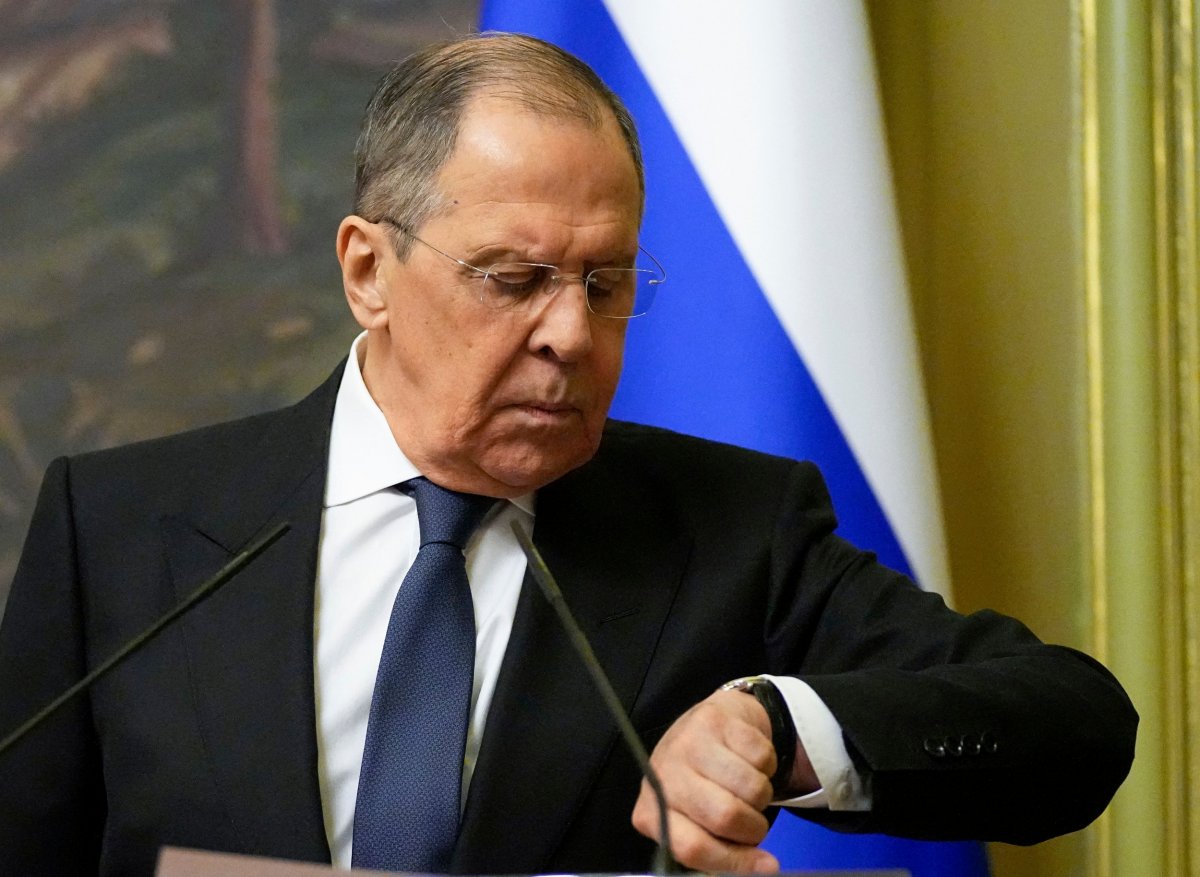Russian Foreign Minister Sergei Lavrov said there is a "serious" risk of World War 3, as he accused NATO of waging a proxy conflict with Moscow.
In a TV interview with Russia's Channel One, Lavrov invoked the possibility of the Ukraine war escalating into a nuclear conflict, despite the repeated insistence by the Kremlin that it would only use conventional weapons.
Kyiv dismissed Lavrov's comments as an attempt to "scare the world off" from backing Ukraine.
In the preamble to the first question Lavrov faced on "Bolshaya Igra" (Big Game), anchor Dmitry Simes referred to President Joe Biden's comments last month that it was "important to avoid a third world war" sparked by a confrontation between Moscow and NATO.
Lavrov was asked to compare the danger of a nuclear confrontation today with what the world faced during the 1962 Cuban Missile Crisis standoff between the U.S. and the USSR.
Lavrov said Moscow and Washington should recommit to a pledge by former Russian and American leaders Mikhail Gorbachev and Ronald Reagan that "there can be no winners in a nuclear war."
"The risks are very significant [of WW3]. I don't want them artificially inflated," Lavrov said, according to a transcript on the Russian foreign ministry website. "The danger is serious, real. It cannot be underestimated."
Weapons and Troops
He said that despite the global call that "in no case should a Third World War be allowed," the demands of Ukraine for NATO troops and the supply of weapons to Kyiv "adds fuel to the fire."
It signals a shift in rhetoric from Moscow in the last few days amid fears that Vladimir Putin might resort to tactical or other limited nuclear weapons if his campaign in Ukraine continued to face setbacks.
Last week, Lavrov appeared to back up comments previously made by Kremlin spokesman Dmitry Peskov that Russia would use "conventional weapons only" in the war.
But in the interview broadcast on Monday, Lavrov said: "During the Cuban Missile Crisis there were not many written rules, but the rules of conduct were clear enough. Moscow understood how Washington was behaving. Washington understood how Moscow was behaving.
"Now there are few rules left," Lavrov said, referring to the expiration of agreements like the Intermediate-Range Nuclear Forces Treaty (INF).
He suggested that agreements, such as the 2010 New START treaty limiting strategic warheads and launchers, which was renewed until 2026 when Biden took office, were key to curbing nuclear threats.
However, Daryl Kimball, executive director of the Arms Control Association, said that the Ukraine war was a big obstacle to an agreement to regulate American and Russian strategic arsenals.
"The prospects for negotiating follow-on agreements from New START have gone way, way down," Kimball told Newsweek last week. "When dialogue can resume, no one knows, it certainly cannot resume while fighting continues.
In their Geneva summit in 2021, Biden and Vladimir Putin agreed to resume a strategic stability dialogue on nuclear weapons. Further talks were halted after Russia's buildup of troops on the Ukraine border, before its full-scale invasion.
"Despite Putin's war in Ukraine it would remain in the U.S. and international security interests to maintain common sense limits on their arsenals," Kimball said.
He added that while a nuclear conflict was "unlikely," an "accidental shootdown of a Russian fighter in Polish airspace" would be an example of a scenario which could "lead to a widening of the war" as well as the direct involvement of NATO.
"That in turn can escalate out of control and ultimately lead to nuclear weapons being used."
Guterres in Moscow
Lavrov's comments come as UN Secretary General Antonio Guterres is due to meet Russian President Vladimir Putin on Tuesday following failed diplomatic efforts so far.
The talks are expected to focus on the besieged city of Mariupol, where despite declaring a victory, Russian forces have failed to take the Azovstal steelworks.
Meanwhile, Ukrainian Foreign Minister Dmytro Kulebo said Lavrov's comments on Monday were an attempt by Russia "to scare the world off supporting Ukraine."
He tweeted that the "talk of a 'real' danger of WWIII only means Moscow senses defeat in Ukraine."
Newsweek has contacted the Ukrainian foreign ministry for comment.

Uncommon Knowledge
Newsweek is committed to challenging conventional wisdom and finding connections in the search for common ground.
Newsweek is committed to challenging conventional wisdom and finding connections in the search for common ground.
About the writer
Brendan Cole is a Newsweek Senior News Reporter based in London, UK. His focus is Russia and Ukraine, in particular ... Read more
To read how Newsweek uses AI as a newsroom tool, Click here.








